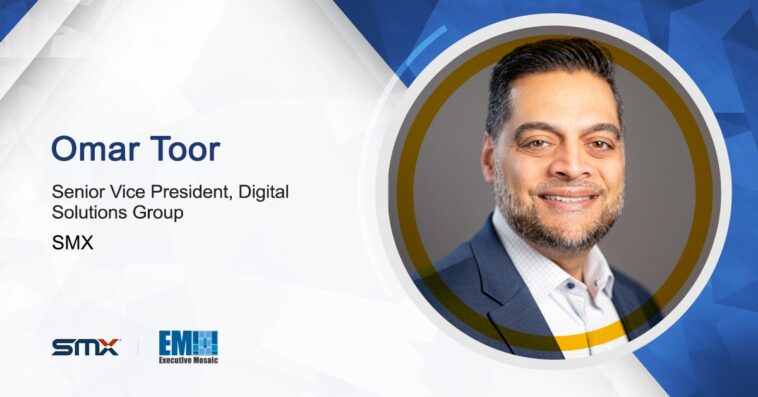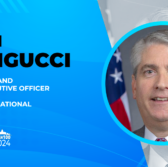Omar Toor currently serves as senior vice president of SMX’s Digital Solutions Group. In this role, he leads profit and loss and growth initiatives for the company’s federal civilian and commercial divisions as well as its state, local and education arm. His work focuses on business strategy, developing new approaches to the government contracting marketplace and finding creative ways to meet customer needs.
Prior to joining SMX in October 2023, Toor was a senior director at General Dynamics Information Technology, where he managed profit and loss for the organization’s state and local business. His earlier executive roles include director of PricewaterhouseCoopers’ public sector financial services unit and vice president of civilian information technology at DMI.
In a recent Executive Spotlight interview, Toor broke down the ways in which emerging technologies could transform federal operations and evaluated the challenges that come with cloud migration. He also offered a look into SMX’s culture and shared his advice for aspiring GovCon executives.
Which emerging technologies do you anticipate will have the greatest impact on the federal landscape in the next few years?
Several emerging technologies are poised to have a significant impact on the federal landscape in the coming years, including zero trust offerings and advanced cybersecurity technologies; artificial intelligence and machine learning; and quantum computing.
As government agencies continue to face sophisticated cyber threats, adopting zero trust architectures is essential. Zero trust principles, which operate on the assumption that threats could be both external and internal, mandate strict identity verification for every user and device trying to access resources on a private network, regardless of their location. Cloud-Native Application Protection Platforms, or CNAPP, is a component of zero trust that focuses on securing applications across their entire life cycle — from development through deployment and runtime. CNAPP integrates various security tools, including cloud workload protection platforms, or CWPP, and cloud security posture management, referred to as CSPM, to provide a holistic view and security assessment of cloud-native applications. Another facet is Web Application and API Protection, or WAAP. These solutions are crucial in protecting web applications and APIs from threats and vulnerabilities. They combine and extend capabilities from traditional web application firewalls and API protection technologies to safeguard against new and evolving attacks.
An additional emerging area is found in AI/ML technologies, which offer tremendous potential for government agencies in areas such as data analysis, predictive modeling, automation and decision support systems. AI can enhance efficiency, improve citizen services and strengthen national security efforts through applications like predictive analytics for law enforcement and cybersecurity.
Lastly, quantum computing, though currently in its nascent stages, holds the promise of transforming fundamental aspects of data processing, cryptography and simulation capabilities. Within the federal domain, quantum computing stands poised to propel scientific research to new heights, streamline logistical operations and fortify encryption methodologies, thereby bolstering national security. In federal applications, the potential of quantum computing extends far and wide.
One of its use cases is in scientific research advancement. Quantum computing’s unparalleled processing power offers unprecedented opportunities for complex simulations, enabling researchers to model intricate phenomena with unparalleled precision. This capability holds the potential to accelerate breakthroughs in fields such as material science, pharmaceuticals and climate modeling, driving innovation and progress.
The immense computational capabilities of quantum computers can also revolutionize logistical operations, optimizing supply chains, transportation routes and resource allocation. By harnessing quantum algorithms, federal agencies can address complex logistical challenges more efficiently, leading to cost savings, improved resource utilization and enhanced operational efficiency.
Lastly, quantum computing can accelerate scientific research, optimize logistical operations and develop quantum-resistant encryption techniques to bolster national security. In the federal landscape, this capability is critical for safeguarding sensitive data and communications against emerging threats. By adopting quantum-safe encryption protocols, federal agencies can bolster cybersecurity defenses and ensure the integrity and confidentiality of classified information.
By leveraging these emerging technologies, government agencies can enhance their capabilities, improve service delivery and address complex challenges more effectively, ultimately driving innovation and progress in the federal landscape.
What are some of the key barriers that remain in widespread federal cloud migration, and how do you think we can overcome them?
Several key barriers persist and are widespread in federal cloud migrations, spanning into technical, organizational, security and policy related challenges. Two that I feel are most prevalent in the market today are security concerns and compliance and regulation challenges.
Security is a paramount concern for government agencies due to their management of sensitive and classified information. Several factors contribute to the apprehension surrounding cloud adoption, including data breaches, stringent compliance requirements and issues related to data sovereignty. These concerns can be mitigated by adopting advanced security protocols, ensuring compliance through robust security frameworks like FedRAMP and establishing clear data sovereignty policies that dictate how and where data can be stored and processed.
Government agencies are bound by stringent regulations and compliance standards, which must be upheld when adopting cloud services. Meeting these requirements is often complicated by factors such as intricate authorization processes, skill gaps and the need for continuous monitoring and configuration management to maintain a compliant cloud environment.
By addressing these barriers through a combination of technological innovation, strategic planning, and organizational change, government agencies can successfully migrate to the cloud and realize the benefits of increased flexibility, scalability and efficiency.
What are SMX’s core values? How do you think these values translate into continued success and growth in the GovCon market?
The culture of SMX is centered around our five core values: adapt deliberately, clients first, communicate transparently, cultivate belonging and invest in our people. As a leader at SMX, the two core values that resonate with me most are ‘communicate transparently’ and ‘clients first.’
The core value to ‘communicate transparently’ means to communicate honestly, directly and transparently, both inside of SMX and with our clients. SMX values being truthful and forthright, but also always communicating with respect. Transparent communication is not only a best practice but a strategic imperative for success and growth in the government contracting market. By building trust with clients, mitigating risks, demonstrating compliance, managing expectations, facilitating collaboration and responding to market changes, GovCon firms can position themselves for long-term success and sustainability.
‘Clients First’ focuses on delivering exceptional experiences by listening to clients’ needs, understanding their requirements and delivering solutions that meet and exceed their expectations. Putting the client first is paramount in the GovCon market for fostering success and growth. Prioritizing the client’s needs and satisfaction isn’t just a moral imperative; it’s a strategic advantage that builds repertoire and growth in the GovCon market.
What advice would you give to those who are pursuing executive-level positions in GovCon and looking to accelerate their professional growth?
For individuals aiming to pursue executive-level positions in GovCon and accelerate their professional growth, I have five main pieces of advice.
The first is to develop expertise. Gain specialized knowledge in areas critical to GovCon such as compliance, contract management or cybersecurity. Keep abreast of legislative changes, technological advancements and shifts in government priorities which could impact your field. This can be achieved through regular engagement with professional associations, subscribing to industry publications and participating in relevant webinars and workshops.
You should also build a strong network. Actively engage with professionals in your industry through online platforms like LinkedIn, attend GovCon-related events and join committees or boards of industry associations. Networking should be strategic; identify and connect with individuals whose interests align with yours and who can potentially open doors to new opportunities.
The third is to seek leadership opportunities. Volunteer to lead new projects or spearhead organizational change initiatives within your company. Outside your organization, consider roles in industry groups or advisory boards where you can influence policy or drive innovation. These positions highlight your leadership to a broader audience and can significantly enhance your visibility in the industry.
Fourth, you must demonstrate results. Quantify your achievements in terms of financial performance, project successes or efficiency improvements. Develop a portfolio of case studies or white papers that demonstrate your thought leadership and ability to solve complex problems. This evidence-based approach will speak volumes about your capability to prospective employers or partners.
Lastly, demonstrate integrity and ethics. In an industry where legal and ethical standards are non-negotiable, consistently demonstrate your commitment to high standards in every action and decision. This commitment builds a strong reputation, fostering trust among colleagues, clients and stakeholders.
By following these pieces of advice and continuously striving for excellence, aspiring GovCon executives can position themselves for success and accelerate their professional growth in the industry.





